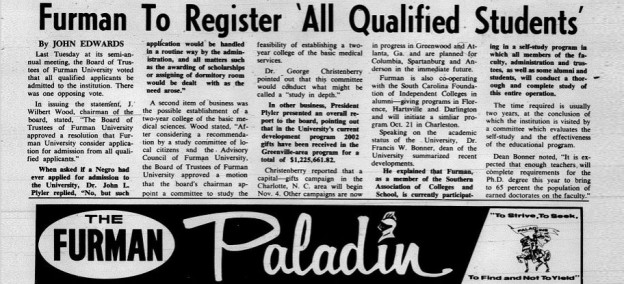
A panel of professors from the communications, English and sociology departments sought to enlighten an audience of 30 students and community members on the subject of race and its origins in a CLP called Forgetting Race: Reconstruction 150 Tues., Feb. 2.
The professors explored the origins of race relations in America stemming from the reconstruction era and the rhetoric behind it – referencing an article written by Ta-Nehisi Coates on mass incarceration, ideology and social construction of race, and racism in the prison system.
The different academic perspectives of the panel members helped foster an open discussion of the different components of race.
Brandon Inabinet, Ph.D., associate professor of communication studies, provided insight into the ways of interpreting the effects and the aftermath of reconstruction.
“Reconstruction is debated among historians, but is of course mostly seen as the necessary thing after the Civil War by our current viewpoints,” Inabinet said. “You have to do something to try to guarantee African-Americans some kind of rights.”
However, not all viewpoints are that simple. Inabinet explained that the Dunning school of thought blames the failures of reconstruction on the radicalness of it and the “vengeance” of the northern radical republicans against the southern confederates. This thought school claims that the radicalness of the proposed laws to grant rights to African-Americans eventually led to the instatement of the Jim Crow laws.
Cynthia King, Ph.D. elaborated on how society’s view of slavery according to Ta-Nehisi Coates’ article remains unchanged due to the assumption that slavery would have been resolved eventually and that the bad parts of slavery aren’t taught in class. Additionally, King points out that in his article, Coates is encouraging more conversation about the subject to better understand its origins.
In terms of the modern day implications of race, Laura Morris, Ph.D. of the English department commented on our incarceration rates and how our views on race are perpetuated “by a long history of prejudice and inequality.”
So what can we do about our 150-year-old missteps? Claire Whitlinger, Ph.D. of the sociology department suggests symbolic and financial reparation to the groups involved citing the example of the government’s financial compensation of victims of Japanese internment camps during World War II and the Tulsa, Okla. race riots.
“Clearly, there is precedent in this country for providing financial compensation to victims of survivors of systematic, often state sponsored racial violence” Whitlinger said, also discussing the United States Senate’s series of formal apologies in recent years for fundamental issues such as slavery.
However, Whitlinger stressed that symbolic reparation alone was not enough to make up for the damages.
“We need to…do a better job of understanding the consequences of symbolic reparations such as commemorations and memorials and under what circumstances we need to broaden…social change,” she said.
According to the presenters, in order to address the issues we face with race today, we need to consider its historical implications as well as the way it affects society today.
